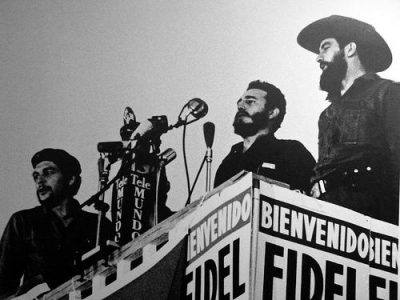On June 15, the National Film Preservation Foundation (NFPF) awarded grants to guarantee the preservation of 64 films. One of those is IPS Fellow Saul Landau’s powerful 1968 documentary, “Fidel!” Funded by the Library of Congress, the NFPF grants “target newsreels, silent-era films, documentaries, culturally important home movies, avant-garde films and endangered independent productions that fall under the radar of commercial preservation programs,” according to The Hollywood Reporter.

Thanks to a grant, a documentary focusing on Fidel Castro will be preserved. Creative Commons photo by Pietroizzo
It’s the perfect cinematic metaphor for the struggle against imperialism, captured cleverly by Landau and his crew during the early years of the U.S. embargo. Towering over all the Cubans on the field and sporting his signature crisp olive green uniform, Castro — the subject of over 600 CIA assassination attempts and the CIA’s unsuccessful Bay of Pigs invasion earlier in 1961–declares, “I’m not leaving till I belt one.” He strikes out, again and again. “As long as he’s willing to pitch, I’ll try to hit one,” a determined Castro shouts, much to the delight of the crowd. The founding father of the post 1959 revolutionary Cuba then removes his constricting and sweaty uniform and wears a more suitable jersey. After a brief stint as pitcher, he finally hits a home run.
It’s a temporary moment for celebration in the film, as Landau’s camera follows Castro in a rocky jeep traveling through the Sierra Maestra and Sierra Cristal mountains, on a helicopter observing the landscape, inside a tent eating dinner and at the podium as he discusses the challenges of instituting the revolution’s gains, of creating a proud and productive populace, of overcoming the problems of underdevelopment, all while facing perpetual, hostile threats from a behemoth miles away.
These intimate moments on camera—down to the close up of Castro’s terribly dirty fingernails– merit preservation for life because of the incisive insights that they shed not only on Castro’s style of leadership and Cuba’s early history post Batista, but on any profound social, political, economic and cultural changes that a country faces. Hopefully, a series of comparable films will emerge in the next five years about the changes underway in Tunisia, Egypt, Syria and other “Arab Springs.”
“Fidel!” also exemplifies how films, when done right, can serve as an important tool for understanding—in this case, the complexity of the Cuban Revolution. On the one hand, a portrait of paternalism emerges. Outside of the more developed Havana, villagers willingly approach Castro, not as the formal leader of their country, but like a father, raising immediate concerns about life—at this point in time, not about the need for more political parties. Some mention that there are not enough buses or ambulances; others complain to him about the lack of roads. “We get promises but no follow-throughs,” a woman says to El Jefe, undaunted. “You’re the one who can get things done,” an old man acknowledges. Whether or not those Cubans on camera “acted” in front of their leader, one cannot mistake the sense of duty they’ve instilled in him, offering viewers a more multi-dimensional narrative of a man going beyond “the evil dictator” who dared to disobey U.S. dictates on more than one occasion.
“Action concerns me more than history,” Castro explains, while eating a modest meal inside a tent with ex-guerrillas now working in his government. It’s a telling, foreshadowing statement on Castro’s legacy inside and outside of Cuba. Castro led the revolution for decades and, following a long hospital stay in 2006, passed all leadership responsibilities on to his younger brother, Raul, with whom he had been in revolutionary partnerships since 1953.
Whatever its internal shortcomings, as the film itself acknowledges, the revolution under Castro’s leadership never compromised on the principles of sovereignty and independence—a sin that the U.S. doesn’t seem to forgive, given its decades-old embargo still in place. A quick glance at Latin America today reveals disobedience inspired by Cuba throughout the hemisphere—in Bolivia, El Salvador, Argentina, Nicaragua, Venezuela, Uruguay, Brazil and more recently, Peru.
One can also take Castro’s statement, “action concerns me more than history,” as a subversive call to action—to not be afraid of making a film, as Saul Landau has done, that just might challenge what the mass media and the establishment wants you to believe about an important actor in the history of Latin America.
Farrah Hassen is a writer and videographer based in Washington DC. From 2008-2009, she was the Newman Fellow at IPS.
